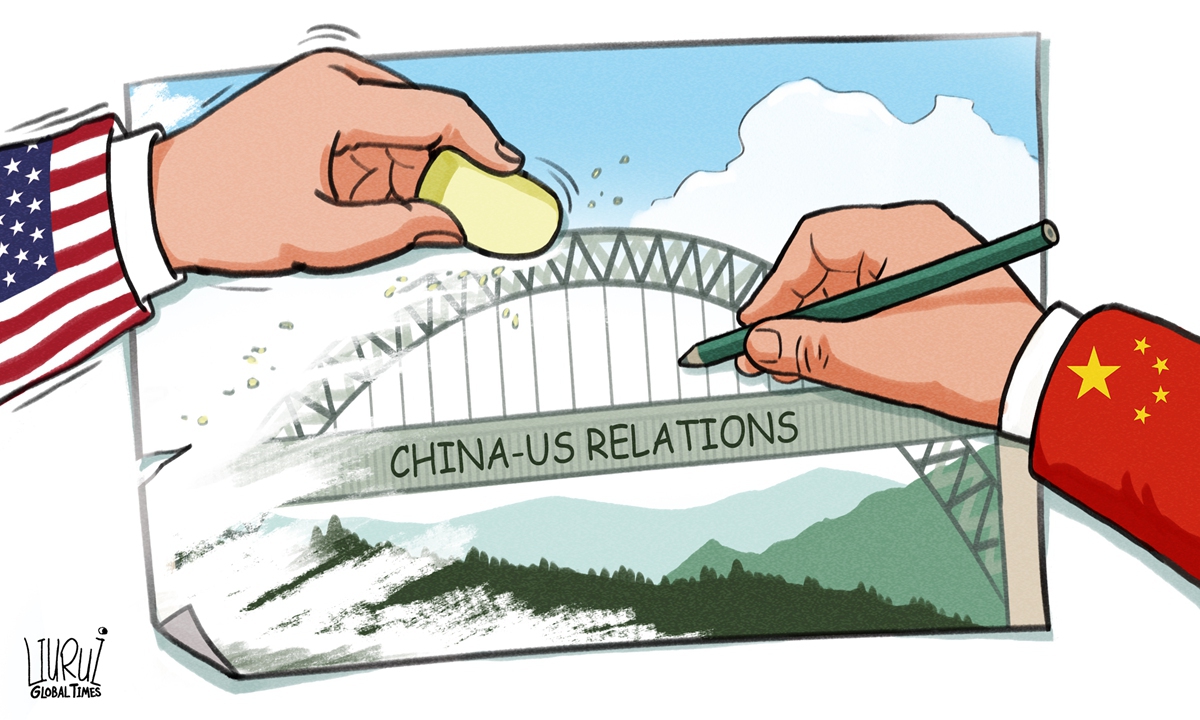
Only by Accepting Responsibilities of a Major Power Can We Work Together To Benefit the World
— Working together to build the five pillars of China-U.S. relations
As two major powers and permanent members of the United Nations Security Council, China and the United States bear special international responsibilities and obligations. The future of the world requires cooperation between China and the U.S.
The recent meeting between the leaders of China and the U.S. in San Francisco was an important one to build trust, manage differences and expand cooperation in their relationship. The meeting was also significant [as a way] to inject certainty and stability into a world undergoing tumultuous changes. Over the past few days, the international community has reviewed the meeting positively. “We look forward to China and the United States playing an important role in global issues”* and “The success of China and the United States is an opportunity for each other and, in turn, an opportunity for the rest of the international community.” *
As two major nations and permanent members of the United Nations Security Council, China and the United States bear special international responsibilities and obligations. In the face of a turbulent world, China and the United States need to be broad-minded, showing the demeanor and taking on the roles and responsibilities of a great power. At the meeting in San Francisco, President Xi Jinping clearly stated that they should "jointly shoulder responsibilities as major countries” and he emphasized "the problems facing human society cannot be solved without cooperation between major countries.” He said, “China and the United States should lead by example, step up coordination and cooperation on international and regional issues, and provide more public goods for the world.” He added, “The two sides should keep their initiatives open to each other, or coordinate and connect them for synergy, to benefit the world.”
Shouldering the responsibilities of a major nation requires, first and foremost, having the mindset of a great power. President Xi pointed out that the world is currently undergoing the sort of change unseen for a century and China and the U.S. have two choices: one is to strengthen solidarity and cooperation, work together to address global challenges and promote world security and prosperity. The other is to adopt a zero-sum mentality, provoke conflict between groups and lead the world toward turmoil and division. These two choices represent two directions that will determine the future of humanity and the planet. It is from this perspective that President Xi said at the Welcome Dinner by Friendly Organizations in the United States, "China is ready to be a partner and friend of the United States. The fundamental principles that we follow in handling China-U.S. relations are mutual respect, peaceful coexistence and win-win cooperation.”
Demonstrating the role and responsibilities of a great power requires taking action to maintain world peace and security and promote global development and prosperity. Over the past 50 years the restoration and development of China-United States relations has benefited the people of the two countries and contributed to world peace, stability and prosperity. At present, the instability and uncertainty of the international situation is increasing. China and the United States need to strengthen communication and cooperation and play a leading role in advancing the noble cause of peace and development of humankind while handling their respective domestic affairs effectively. This is the common goal of China, the United States and the world. During this meeting, the two leaders put forward guidance on prominent issues such as establishing mutual understanding of each other, properly managing differences, promoting dialogue and cooperation, and addressing global challenges such as the war between Israel and Hamas, the Ukraine crisis, climate change and artificial intelligence. Through all-around communication, they further discussed the correct way for China and the U.S. to get along as two major countries and further clarified the responsibilities that China and the United States share. The international community is generally of the view that this meeting has injected stability, certainty and a constructive element into a chaotic world.
Strengthening coordination and cooperation on international and regional issues is part of assuming the responsibilities of a major power. China and the United States are the world's top two economies, with a total economic volume of more than one-third of the world's total and a bilateral trade volume of about one-fifth of the world's total. The warmth of China-United States relations has a bearing on the global economic climate. Going against the grain and pursuing “decoupling and breaking supply chains” will not help boost the U.S. economy and will make the global economy even more fragile. As important members of the G20, China and the United States should enhance collaboration, jointly promote world economic recovery and work together to promote more inclusive, beneficial and resilient global development. The Asia-Pacific region is where the interests of China and the United States are most closely knitted together and most often interact. China and the U.S. should strengthen cooperation to achieve the goal of building an open, dynamic, resilient and peaceful Asia-Pacific community by 2040.
Providing more public goods to the world is an important expression of assuming the responsibility of a major power. President Xi, in his speech at the Welcome Dinner, said that China's Belt and Road Initiative, as well as its Global Development Initiative, Global Security Initiative and the Global Civilization Initiative, are always open to all countries, including the United States. China is also willing to participate in multilateral cooperation initiatives proposed by the United States. China has put forward a series of important initiatives to provide Chinese solutions to global challenges, which have received broad support and participation from the international community. China and the United States jointly providing more public goods to the world, with their initiatives open to each other and with strengthened coordination and alignment, can better promote the well-being of people in all countries.
Currently, the issue of climate change is attracting increased global attention. China and the U.S. have huge potential for cooperation in areas such as green development and addressing climate change. The two sides can strengthen cooperation in this area and make it a new highlight in the development of China-U.S. relations. During this meeting, the two leaders emphasized the importance of accelerating efforts to respond to the climate crisis in the critical decade ahead. They welcomed the recent positive discussions held by the climate envoys from both countries, including: domestic reduction actions in the 2020s, joint efforts to ensure the success of the United Nations Climate Change Conference and the launch of the China-U.S. Working Group on Enhancing Climate Action in the 2020s to accelerate meaningful climate action. As COP28 nears, the consensus reached by the leaders of China and the U.S. will undoubtedly boost global confidence in addressing climate change.
We are in a time full of challenges and change, but also a time of hope. The future of the world requires cooperation between China and the U.S. From the perspective of the common interests of the two countries and the shared destiny of humanity, China and the U.S. should jointly share the responsibilities of great powers, work together to deal with global challenges, strive to enhance the well-being of the people of the two nations and promote the progress of human society.
*Editor’s Note: These quotes, accurately translated, could not be independently verified.

